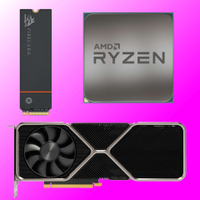Baldur's Gate 3 FSR 2.2 upgrade likely to drop 'closer to September 6'
Improved upscaling for AMD, Intel, and non-RTX gamers alike.
Larian Studios has confirmed it's working on FidelityFX Super Resolution (FSR) 2.2 support in Baldur's Gate 3—a much needed upgrade for anyone gaming on an AMD, Intel, or older Nvidia graphics card.
The developer in an earlier blog post confirmed the upgrade to FSR 2.2 is expected to happen "closer to September 6", the date when the game is set to launch on PlayStation 5.
Baldur's Gate 3 has two upscaling technologies to choose from at launch: FSR 1.0 and DLSS.
In my testing, DLSS is the far better option, delivering decent fidelity and a big performance uplift while enabled. The issue is DLSS is a proprietary technology limited to Nvidia 20/30/40-series graphics cards. FSR 1.0, on the other hand, has the potential to deliver even greater performance gains on all manner of graphics card, regardless of manufacturer, but at the expense of visual quality. While useful in a pinch, FSR 1.0 just doesn't quite cut it.
FSR 2.2 is a major upgrade over FSR 1.0. When I've tested FSR 2.2 in the past, it's been noticeably clearer, better with motion, and still delivers a healthy bump to frame rates. It's a pretty much all-round improvement.
FSR 2.2 also benefits from hardware acceleration on newer RDNA 2 and RDNA 3 graphics cards, but these improvements shouldn't slow it down on other GPUs.
For Steam Deck players, this could make the game run better on the handheld. While the game has received the official Steam Deck Verified stamp of approval, FSR 2.2 will likely make it run even better.
The biggest gaming news, reviews and hardware deals
Keep up to date with the most important stories and the best deals, as picked by the PC Gamer team.
Best CPU for gaming: Top chips from Intel and AMD.
Best gaming motherboard: The right boards.
Best graphics card: Your perfect pixel-pusher awaits.
Best SSD for gaming: Get into the game first.

Jacob earned his first byline writing for his own tech blog. From there, he graduated to professionally breaking things as hardware writer at PCGamesN, and would go on to run the team as hardware editor. He joined PC Gamer's top staff as senior hardware editor before becoming managing editor of the hardware team, and you'll now find him reporting on the latest developments in the technology and gaming industries and testing the newest PC components.


